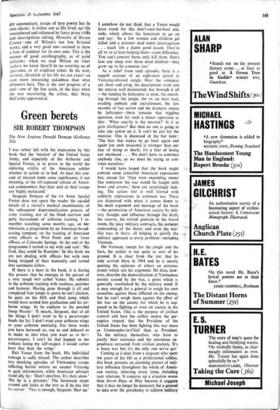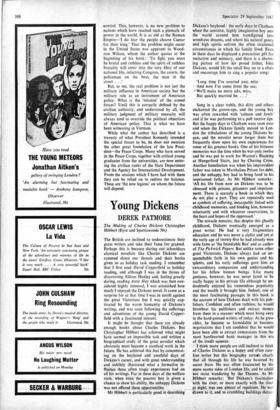Green berets
SIR ROBERT THOMPSON
I was rather left with the impression by this book that the 'mission' of the United States Army, and especially of the Airborne and Special Forces, is to prove to the world the enduring virility of the American soldier whether in action or in bed. At least this con- cept of mission lends some significance, if not meaning, to the oft-repeated refrain of Ameri- can commanders that their unit or their troops are 'highly motivated.'
Sergeant Duncan of the us Army Special Forces does not spare the reader the squalid details of a recruit's medical examination, of the subsequent depersonalisation process of army training, nor of the blind exertion and petty harassment of airborne training. I re- member watching some months ago, on sec television, a programme by an American broad- casting company on the training of American army officers at West Point and air force officers at Colorado Springs. At the end of the programme I turned to my wife and said: 'My God, they could be Russians.' In this book we are not dealing with officers but with men being stripped of their humanity and turned into automatic killers.
If there is a hero in the book, it is during this process that he emerges in the person of a very tough NCO called Vance. He submits to the airborne training with coolness, patience and humour. Having gone through it all and completed four jumps to prove he isn't chicken, he quits on the fifth and final jump which would have earned him graduation and his air- borne wings. As he explains to the puzzled Jump Master: 'It means, Sergeant, that of all the things I don't want to be a paratrooper heads the list. I don't want your airborne wings or your airborne mentality. For three weeks you have harassed us, run us and debased us to make us into what you want us to be— paratroopers. I can't let that happen to me without losing my self-respect. I would rather have that than the wings.'
Exit Vance from the book. His individual courage is sadly missed. The author describes two shocking episodes of Vietnamese troops inflicting bestial torture on suspect Vietcong to gain information, while American advisers stand idly by: 'Don't interfere. It's their show.' 'But he is a prisoner.' The lieutenant snaps around and looks at the NCO as if he has lost his senses. 'That is enough, Sergeant. Shut up.'
I somehow do not think that a Vance would have stood for this don't-rock-the-boat atti- tude, which allows the lieutenant to go on and say : 'So a few women and children get killed and a prisoner died under interrogation . . . teach 'em a damn good lesson. They're all vc or at least helping them—same difference. You can't convert them, only kill them. Don't lose any sleep over those dead children—they grow up to be commies too.'
As a relief from such episodes there is a superb account of an eight-man patrol in Vietcong-infested jungle. Here the sentences are short and crisp, the descriptions vivid and the tension well maintained, but through it all —the landing by helicopter at dusk, the march- ing through the jungle, the vc on their trail, evading ambush and encirclement, the few seconds of fast action and the dramatic rescue by helicopter—there remains that niggling question, even for such a minor operation as this: 'What exactly is the mission?' Is it to gain intelligence? But then no one is going to take any action on it. It can't be just for the exercise. This is discussed in the bar later: 'The fear that makes us go back again and again kin such missions] is stronger than our fear of dying or death; it's a fear of losing our manhood . . . We don't have to convince anybody else, so we must be trying to con- vince ourselves.'
I would have hoped that the book might contain some colourful American expressions but, except for 'They were expending ammo like tomorrow the war would be fought with bows and arrows,' these are surprisingly lack- ing. The action text is well littered with soldierly expressions in common use. These are dispensed with when it comes down to the main argument and message of the book —the permeation of American society by mili- tary thought and influence through the draft, the reserve, the retired generals in the board room, the juicy military contracts, the constant expounding of the threat and even the war- like toys in Sears, all helping to glorify the military approach to every problem—including Vietnam.
On Vietnam, except for the jungle and the bars, the author is not quite so sure of his ground. It is clear from the text that he only arrived there in 1964 and he is merely quoting the opinions of others on previous events which suit his argument. He does, how- ever, describe the demoralisation of Vietnamese society caused by the war, a point which is generally overlooked by the military mind. It is easy enough for a general to weigh his own casualties against those inflicted on the enemy, but he can't weigh them against the effect of the war on the society for which he is sup- posed to be fighting or even on society in the United States. This is the purpose of civilian control and here the author makes the per- ceptive remark that the President of the United States has been fighting this war more as Commander-in-Chief than as President. To the military themselves, who have to justify their existence and the enormous ex- penditure extracted from civilian pockets, 'It's a lousy war but it's the only one we've got.'
Coming as it does from a sergeant who spent ten years of his life as a professional soldier, this book presents an alarming picture of mili- tary influence throughout the whole of Ameri- can society, infecting every issue, including race relations. It conjures up a situation worse than Seven Days in May because it suggests that it may no longer be necessary for, a general to take over the presidency to achieve military
control. This, however, is no new problem to nations which have reached such a pinnacle of power in the world. It is as old as the Roman Empire-1 do fear the people choose Caesar for their king.' That the problem might occur in the United States was apparent to Wood- row Wilson, whom the author quotes at the beginning of his book : `To fight you must be brutal and ruthless and the spirit of ruthless brutality will enter into the very fibre of our national life, infecting Congress, the courts, the policeman on the beat, the man in the street . .
But, to me, the real problem is not just the military influence in American society but the military role as an instrument of American policy. What is the `mission' of the armed forces? Until this is correctly defined by the civilian authority, and understood by all, the military judgment of military necessity will always tend to override the political objectives of American policy. That is what we have been witnessing in Vietnam.
While what the author has described is a travesty of what President Kennedy intended the special forces to be, he does not mention the other great foundation of the late Presi- dent—the Peace Corps. Many who have served in the Peace Corps, together with critical young graduates from the universities, are now enter- ing the civilian ranks of the State Department and the Agency for International Development. From the sessions which I have had with them they can be relied on to redress the balance. These are 'the new legions' on whom the future will depend.







































 Previous page
Previous page